武汉大学比较文学与世界文学2005真题
- 格式:pdf
- 大小:40.97 KB
- 文档页数:1
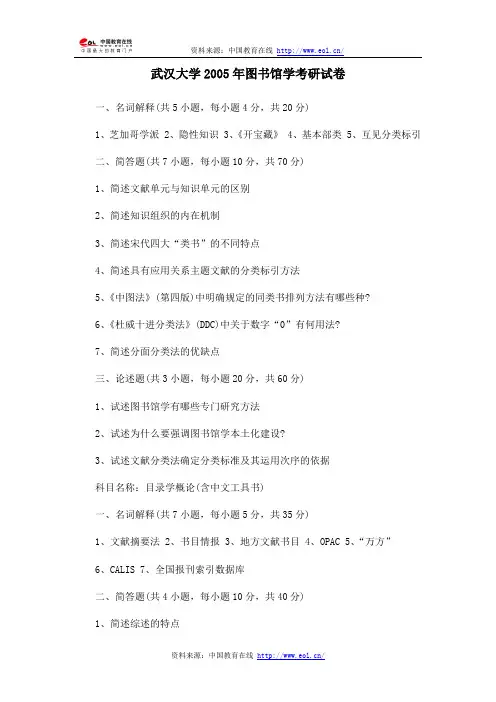
武汉大学2005年图书馆学考研试卷
一、名词解释(共5小题,每小题4分,共20分)
1、芝加哥学派
2、隐性知识
3、《开宝藏》
4、基本部类
5、互见分类标引
二、简答题(共7小题,每小题10分,共70分)
1、简述文献单元与知识单元的区别
2、简述知识组织的内在机制
3、简述宋代四大“类书”的不同特点
4、简述具有应用关系主题文献的分类标引方法
5、《中图法》(第四版)中明确规定的同类书排列方法有哪些种?
6、《杜威十进分类法》(DDC)中关于数字“0”有何用法?
7、简述分面分类法的优缺点
三、论述题(共3小题,每小题20分,共60分)
1、试述图书馆学有哪些专门研究方法
2、试述为什么要强调图书馆学本土化建设?
3、试述文献分类法确定分类标准及其运用次序的依据
科目名称:目录学概论(含中文工具书)
一、名词解释(共7小题,每小题5分,共35分)
1、文献摘要法
2、书目情报
3、地方文献书目
4、OPAC
5、“万方”
6、CALIS
7、全国报刊索引数据库
二、简答题(共4小题,每小题10分,共40分)
1、简述综述的特点
2、简述索引的功能
3、略论工具书的特点
4、简述数据库的类型
三、论述题(75分)
1、论述书目的教育功能,当前为什么要大力倡导书目导读服务?(15分)
2、试述20世纪中国目录学研究的辉煌成就(20分)
3、试论我国四部书目分类体系的产生和发展(20分)
4、联系实际论述工具书的功能用途(20分)。
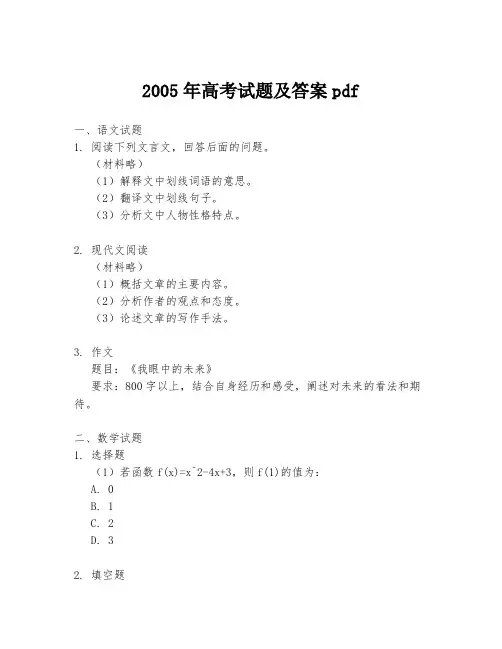
2005年高考试题及答案pdf一、语文试题1. 阅读下列文言文,回答后面的问题。
(材料略)(1)解释文中划线词语的意思。
(2)翻译文中划线句子。
(3)分析文中人物性格特点。
2. 现代文阅读(材料略)(1)概括文章的主要内容。
(2)分析作者的观点和态度。
(3)论述文章的写作手法。
3. 作文题目:《我眼中的未来》要求:800字以上,结合自身经历和感受,阐述对未来的看法和期待。
二、数学试题1. 选择题(1)若函数f(x)=x^2-4x+3,则f(1)的值为:A. 0B. 1C. 2D. 32. 填空题(1)已知圆的方程为(x-2)^2+(y-3)^2=9,求圆心坐标。
3. 解答题(1)证明:若a>b>0,则a^2>b^2。
三、英语试题1. 单项选择题(1)He is the only one of the students who _______ to Canada.A. have beenB. has beenC. have goneD. has gone2. 完形填空(材料略)(1)在空格处选择正确的单词填入。
3. 阅读理解(材料略)(1)根据文章内容,回答下列问题。
四、综合试题1. 政治(1)简述我国的基本经济制度。
(2)论述依法治国的重要性。
2. 历史(1)描述辛亥革命的历史意义。
(2)分析二战对世界格局的影响。
3. 地理(1)解释季风气候的特点。
(2)论述全球气候变化对环境的影响。
答案一、语文试题1. (1)略(2)略(3)略2. (1)略(2)略(3)略3. 作文略二、数学试题1. (1)B2. (1)圆心坐标为(2,3)。
3. (1)略三、英语试题1. (1)D2. (1)略3. (1)略四、综合试题1. (1)略(2)略2. (1)略(2)略3. (1)略(2)略。
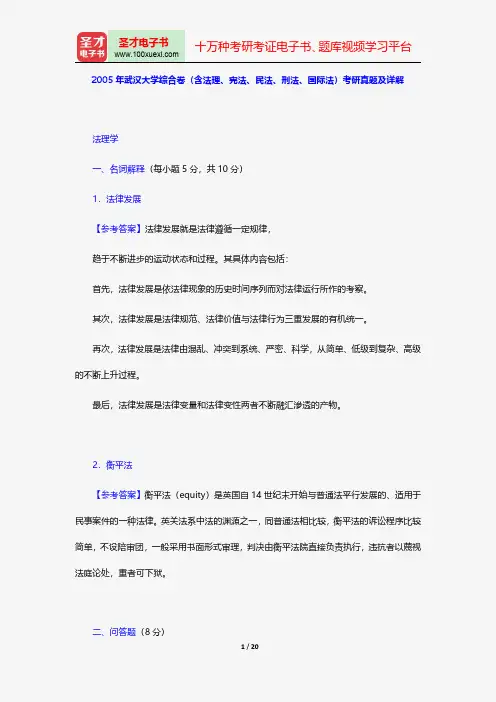
2005年武汉大学综合卷(含法理、宪法、民法、刑法、国际法)考研真题及详解法理学一、名词解释(每小题5分,共10分)1.法律发展【参考答案】法律发展就是法律遵循一定规律,趋于不断进步的运动状态和过程。
其具体内容包括:首先,法律发展是依法律现象的历史时间序列而对法律运行所作的考察。
其次,法律发展是法律规范、法律价值与法律行为三重发展的有机统一。
再次,法律发展是法律由混乱、冲突到系统、严密、科学,从简单、低级到复杂、高级的不断上升过程。
最后,法律发展是法律变量和法律变性两者不断融汇渗透的产物。
2.衡平法【参考答案】衡平法(equity)是英国自14世纪末开始与普通法平行发展的、适用于民事案件的一种法律。
英关法系中法的渊源之一,同普通法相比较,衡平法的诉讼程序比较简单,不设陪审团,一般采用书面形式审理,判决由衡平法院直接负责执行,违抗者以蔑视法庭论处,重者可下狱。
二、问答题(8分)简述程序法的独立价值。
【参考答案】程序法作为法律体系之中的一个不可缺少的部门法,具有其自身的独立价值。
该独立价值主要包括两个方面:内在价值与外在价值。
(一)程序法的内在价值。
程序的内在价值也就是程序的目的性价值,包括安全(秩序)、自由、公正和效益等方面。
(1)安全价值即保障社会和社会多数成员不受各种行为的侵害,维护社会秩序和社会安全。
这表现为社会的一般利益、整体利益。
这种价值体现在司法程序中,也就是追求案件的实体真实的价值。
(2)自由价值。
即保障作为个人的社会成员所享有的免于某种限制的自由(消极自由),以及从事某种活动的自由(积极自由),其核心内容是行为人的基本权利,不受国家权力的非法干预和侵犯。
(3)公正价值。
包括两方面,即程序的一般公正(立法实现)和个别公正(司法实现)。
公正价值要求程序符合社会普遍认可的公平、正义标准,使当事人的权利得到维护,使司法官员的权力受到制约和平衡。
也即通常所说的实现司法公正。
(4)效益价值。
主要指诉讼活动的效果与诉讼的成本之间的比例关系。
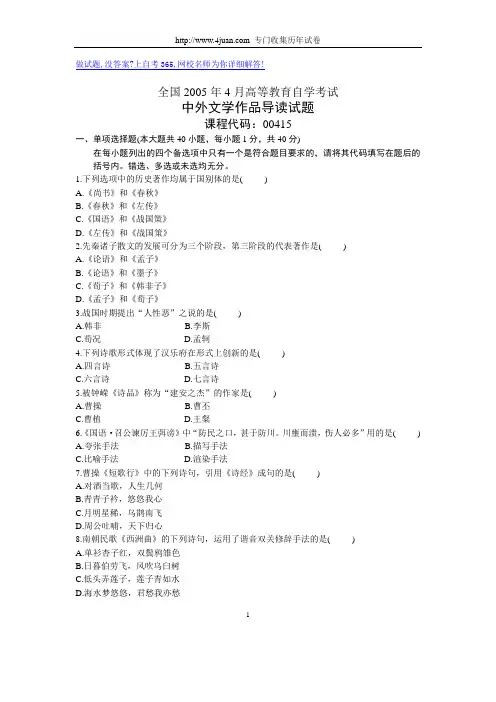
做试题,没答案?上自考365,网校名师为你详细解答!全国2005年4月高等教育自学考试中外文学作品导读试题课程代码:00415一、单项选择题(本大题共40小题,每小题1分,共40分)在每小题列出的四个备选项中只有一个是符合题目要求的,请将其代码填写在题后的括号内。
错选、多选或未选均无分。
1.下列选项中的历史著作均属于国别体的是( )A.《尚书》和《春秋》B.《春秋》和《左传》C.《国语》和《战国策》D.《左传》和《战国策》2.先秦诸子散文的发展可分为三个阶段,第三阶段的代表著作是( )A.《论语》和《孟子》B.《论语》和《墨子》C.《荀子》和《韩非子》D.《孟子》和《荀子》3.战国时期提出“人性恶”之说的是( )A.韩非B.李斯C.荀况D.孟轲4.下列诗歌形式体现了汉乐府在形式上创新的是( )A.四言诗B.五言诗C.六言诗D.七言诗5.被钟嵘《诗品》称为“建安之杰”的作家是( )A.曹操B.曹丕C.曹植D.王粲6.《国语·召公谏厉王弭谤》中“防民之口,甚于防川。
川壅而溃,伤人必多”用的是( )A.夸张手法B.描写手法C.比喻手法D.渲染手法7.曹操《短歌行》中的下列诗句,引用《诗经》成句的是( )A.对酒当歌,人生几何B.青青子衿,悠悠我心C.月明星稀,乌鹊南飞D.周公吐哺,天下归心8.南朝民歌《西洲曲》的下列诗句,运用了谐音双关修辞手法的是( )A.单衫杏子红,双鬓鸦雏色B.日暮伯劳飞,风吹乌臼树C.低头弄莲子,莲子青如水D.海水梦悠悠,君愁我亦愁19.《鸿门宴》中“距关毋内诸侯”的“内”意思是( )A.内心B.纳入C.内部D.交纳10.谢月兆《晚登三山还望京邑》中,紧承“喧鸟覆春洲”之后的诗句是( )A.参差皆可见B.澄江静如练C.杂英满芳甸D.有情知望乡11.中唐时期以元稹、白居易为首而开展的文学运动是( )A.古文运动B.新乐府运动C.浪漫主义运动D.复古运动12.被苏轼称赞为“文起八代之衰”的散文家是( )A.柳宗元B.韩愈C.皮日休D.罗隐13.唐代在艺术上追求奇险怪僻的诗派是( )A.山水田园诗派B.边塞诗派C.韩、孟诗派D.新乐府诗派14.南宋后期追求典雅工丽、讲究字句工巧的格律派词人的代表人物是( )A.刘过B.刘克庄C.刘辰翁D.姜夔15.南宋时期号称“中兴四大诗人”的是( )A.尤袤、杨万里、范成大、陆游B.吕本中、陈与义、范成大、陆游C.尤袤、杨万里、吕本中、陈与义D.吕本中、陈与义、曾几、尤袤16.被认为是与清代国运相始终的散文流派是( )A.阳湖派B.桐城派C.公安派D.竟陵派17.马致远的《夜行船·秋思》的主题是( )A.叹世B.醒世C.惊世D.警世18.杜丽娘和柳梦梅是下列哪一作品中的主人公?( )A.《桃花扇》B.《长生殿》C.《牡丹亭》D.《汉宫秋》19.鲁迅说“传统的思想和写法都被打破了”,所评论的是( )A.《红楼梦》B.《金瓶梅》C.《镜花缘》D.《歧路灯》20.清代“浙西词派”的开创者是( )A.朱彝尊B.陈维崧C.张惠言D.周济21.古印度文学中最古老的一部诗歌总集是( )A.《吠陀》B.《罗摩衍那》C.《摩诃波罗多》D.《五卷书》222.中世纪欧洲城市文学的主要内容是( )A.对贵族阶级进行批判B.对僧侣和封建主进行辛辣讽刺C.对骑士进行嘲笑D.对小市民进行善意批评23.标志着日本诗歌由不定型的古代歌谣发展成为定型的“和歌”,从而奠定了日本文学根基的作品是( )A.《古事记》B.《日本书记》C.《万叶集》D.《源氏物语》24.阿拉伯文学史上的第一部散文巨著是( )A.《圣训》B.《古兰经》C.《卡里来和笛木乃》D.《一千零一夜》25.代表着英国现实主义长篇小说诞生的标志性作品是( )A.《格列佛游记》B.《鲁滨逊飘流记》C.《汤姆·琼斯》D.《乌托邦》26.德国民族文学的奠基人是( )A.莱辛B.席勒C.歌德D.海涅27.狄更斯的《双城记》中的“双城”指的是哪两座城市?( )A.伦敦和巴黎B.伦敦和柏林C.柏林和巴黎D.罗马和伦敦28.法国浪漫主义运动的旗手与领袖人物是( )A.缪塞B.乔治·桑C.大仲马D.雨果29.开创了俄罗斯文学描写“小人物”形象先河的作品是( )A.普希金的《驿站长》B.契诃夫的《小公务员之死》C.屠格涅夫的《父与子》D.陀斯妥也夫斯基的《罪与罚》30.西班牙流浪汉小说的创作目的主要是为了( )A.宣扬“幸福在人间”B.暴露社会现实C.反对禁欲主义D.宣扬忠君爱国思想31.“迷惘的一代”的代表性作品《了不起的盖茨比》的作者是( )A.斯坦贝克B.索尔·贝娄C.菲茨杰拉尔德D.厄普代克32.长篇小说《百年孤独》的作者是( )A.萨特B.加缪C.海勒D.马尔克斯33.主要吸吮着美国西部文学的乳汁成长起来的作家是( )A.海明威B.马克·吐温C.杰克·伦敦D.斯坦贝克334.《伊利亚特》刻画了众多英雄人物,其中以其足智多谋闻名的是( )A.阿伽门农B.奥德修斯C.赫克托耳D.阿喀琉斯35.五四文学革命后出现的第一个新文学社团是( )A.创造社B.语丝社C.新月社D.文学研究会36.郭沫若早年倾向于什么样的思想?( )A.进化论B.泛神论C.马克思主义D.无政府主义37.老舍反映旧北京沦陷时期市民生活的长篇小说是( )A.《四世同堂》B.《骆驼祥子》C.《茶馆》D.《鼓书艺人》38.下列哪部作品将悲剧、喜剧融为一体、创造了寓泪于笑的艺术效果?( )A.鲁迅的《阿Q正传》B.茹志鹃的《百合花》C.赵树理的《小二黑结婚》D.曹禺的《雷雨》39.建国后第一次大规模的思想文化批判运动是( )A.对俞平伯《红楼梦研究》的批判B.对电影《武训传》的批判C.对“胡风反革命集团”的批判D.对“丁陈反党集团”的批判40.被称作“新时期报告文学繁荣的报春花”的作品是( )A.柯岩的《奇异的书简》B.徐迟的《哥德巴赫猜想》C.黄宗英的《大雁情》D.陈祖芬的《祖国高于一切》二、简答题(本大题共5小题,任选其中的4个小题作答,5个小题全答者,按前4题计分,每小题6分,共24分)41.阅读《诗经·黍离》回答下面提出的问题:彼黍离离,彼稷之苗。
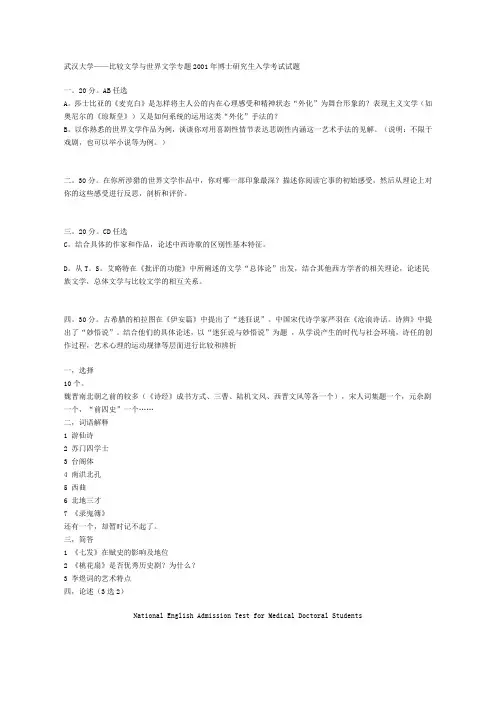
武汉大学——比较文学与世界文学专题2001年博士研究生入学考试试题一。
20分。
AB任选A。
莎士比亚的《麦克白》是怎样将主人公的内在心理感受和精神状态“外化”为舞台形象的?表现主义文学(如奥尼尔的《琼斯皇》)又是如何系统的运用这类“外化”手法的?B。
以你熟悉的世界文学作品为例,谈谈你对用喜剧性情节表达悲剧性内涵这一艺术手法的见解。
(说明:不限于戏剧,也可以举小说等为例。
)二。
30分。
在你所涉猎的世界文学作品中,你对哪一部印象最深?描述你阅读它事的初始感受,然后从理论上对你的这些感受进行反思,剖析和评价。
三。
20分。
CD任选C。
结合具体的作家和作品,论述中西诗歌的区别性基本特征。
D。
从T。
S。
艾略特在《批评的功能》中所阐述的文学“总体论”出发,结合其他西方学者的相关理论,论述民族文学,总体文学与比较文学的相互关系。
四。
30分。
古希腊的柏拉图在《伊安篇》中提出了“迷狂说”。
中国宋代诗学家严羽在《沧浪诗话。
诗辨》中提出了“妙悟说”。
结合他们的具体论述,以“迷狂说与妙悟说”为题,从学说产生的时代与社会环境,诗任的创作过程,艺术心理的运动规律等层面进行比较和辨析一,选择10个。
魏晋南北朝之前的较多(《诗经》成书方式、三曹、陆机文风、西晋文风等各一个),宋人词集题一个,元杂剧一个,“前四史”一个……二,词语解释1 游仙诗2 苏门四学士3 台阁体4 南洪北孔5 西曲6 北地三才7 《录鬼簿》还有一个,却暂时记不起了。
三,简答1 《七发》在赋史的影响及地位2 《桃花扇》是否优秀历史剧?为什么?3 李煜词的艺术特点四,论述(3选2)National English Admission Test for Medical Doctoral StudentsPAPER ONEPart I ListeningSection A ºDirections: In this section of the test, you will hear 15 short conversations between two speakers.At the end of each conversation, a question will be asked about what was said. The conversations a nd questions will be read only once. You must listen carefully and choose the right answer from th e four choices marked A, B, C and D. Mark your answer on the ANSWER SHEET.For Example: A B D1. A. John is good at painting.B. John’s sister’s son is good at painting.C. The woman suggest the man take up painting.D. The woman is making fun of the man.2. A. He has a fried who majored in economics.B. He hasn’t taken mo re than one economics course.C. He’s been learning a lot this year, too.D. He couldn’t make any sense out of his course.3. A. Check the price of calculators. B. Finish his statistics homework.C. Look for a job in mathematics.D. Use a smaller calculator.4. A. Because the police stopped him. B. Because the driver charged too much.C. Because he had been robbed.D. For no good reason.5. A. Take some more vegetables. B. Pass the woman the meat.C. Avoid taking any more food.D. Help to prepare the potatoes.6. A. In her office. B. In the library.C. In the laboratory.D. In the conference room.7. A. Professor Miller offered more help than he had expected.B. Professor Miller will not discuss the topic with him.C. He asked Professor Miller for some books.D. Professor Miller gave him more books than he had requested.8. A. She thinks the explanations are difficult.B. The explanations will be added in a later edition.C. She thinks the book should include more information.D. The book includes an explanation of all the answers.9. A. He probably supports nuclear power plants.B. He probably opposes nuclear power plants.C. He probably no opinion on this topic.D. He probably tries to understand both sides.10. A. Use every minute of their time wisely.B. Live there until the final time.C. Finish their assignments early if possible.D. Save the lab samples.11. A. She is dependable. B. She is hard-working.C. She is kind.D. She is helpful.12. A. It made her ill.B. She believes the refreshments could have been better.C. She feels regret about the lack of success.D. She felt that her clothes were inappropriate.13. A. She likes to get E-mails.B. She hasn’t seen her friends just lately.C. She lives in the same house with the man and woman are talking.D. She is their best friend.14. A. He doesn’t need a green pen.B. He never bought a green pen.C. He never returned the woman’s green pen to her.D. He doesn’t have a green pen with him.15. A. Bill will buy the car as soon as he gets the money.B. Bill’s friend is buying the car from him.C. Bill can’t afford to buy a new car.D. Bill has already made the down payment on the car.Section B ºDirections: In this section of the test, you will hear three talks. After each talk, there are fiv e questions. The talks and questions will be read only once. You must listen carefully and choose the right answer from the four choices marked A, B, C and D. Mark your answer on the ANSWER SHEET.For Example: A B DTalk One16. A. A nutritionist. B. A professor.C. A dining hall manager.D. A doctor.17. A. A note for his doctor. B. A dining hall pass.C. A list of restaurants.D. A food chart.18. A. He’s an athlete. B. He has high blood pressure.C. He has a high cholesterol level.D. He’s overweight.19. A. In the hospital cafeteria. B. In his room.C. In restaurants.D. In the dining hall.20. A. Angry. B. Hungry.C. Relieved.D. Tired.Talk Two21. A. Fire prevention. B. Pest control.C. House construction.D. Toxic chemicals.22. A. It’s cheaper. B. It’s safer.C. It’s quicker.D. It’s readily available.23. A. To keep the heat inside.B. To prevent insects from escaping.C. To reduce the risk of fire.D. To keep the wood dry.24. A. To show that the treatment will not cause fire.B. To emphasize the dangers of the old method.C. To explain a step in the new technique.D. To illustrate a compromise between old and new systems.25. A. Above 125 degrees Centigrade. B. About 50 degrees Centigrade.C. Around 65 degrees Centigrade.D. At 80 degrees Centigrade.Talk Three26. A. Read and commented on the proposed topics.B. Had conferences with some students.C. Returned the topic papers to her students.D. Realized their research papers are due in six weeks.27. A. A recent textbook assignment. B. Requirements for the final examination.C. Choosing research topics.D. Preparing an outline for a paper.28. A. Immediately. B. The following week.C. In two weeks.D. At the end of the semester.29. A. To present final papers. B. To give a model of outline style.C. To discuss the preliminary outline.D. To discuss final grades.30. A. With a thesis statement. B. With a list of references.C. With a summary of the conference.D. With the student’s name.Part II Vocabulary (10%)Section ADirections: In this section all the sentences are incomplete. Four words or phrases, marked A, B, C and D, are given beneath each of them. You are to choose one word or phrase that best completes the sentence. Then, mark your answer on the ANSWER SHEET.31.The fact is, doctor, I just can't _____ this dreadful cough.A. get out ofB. get rid ofC. get down toD. get round to32. After eight hours at the wheel of the lorry, the driver was beginning to feel the _______.A. nervousnessB. tensionC. strainD. extension33. The Chinese government is determined to ____ the established policy of developing agriculture.A. go afterB. go byC. go aheadD. go on34. The Manager has asked to see the sales _____ resulting from our recent advertising campaign.A. numbersB. figuresC. amountsD. quantities35. The local medical officer reported a serious _____ of food-poisoning.A. stateB. incidentC. outbreakD. event36. They didn’t know how to put in a central-heating system, but they managed it by trial and ___ __.A. blunderB. slipC. errorD. mistake37.I was going to say something about the matter; but _____ I gave it up.A. on second thoughtsB. on the wholeC. at the thought ofD. on second thought38. Even if it is a cold day, I think cool water looks _______.A. invitingB. distastefulC. disgustingD. repulsive39. The man’s face was _______ from his infected tooth despite his visit to the dentist.A. bulgingB. swollenC. dilatedD. expanded40. Similar ethical questions ______ as advances are made in such areas as organ transplant andfetal in utero surgery.A. appealB. ariseC. arouseD. abuseSection BDirections: Each of the following sentences has a word or phrase underlined. There are four other words or phrases beneath each sentence. Choose the one word or phrase which would best keep the me aning of the original sentence if it were substituted for the underlined part. Mark your answer on the ANSWER SHEET.41. Many people came to donate blood of their own accord.A. willinglyB. for their own sakeC. of their ownD. without the help of others42. When natural gas burns, the hydrocarbon molecules break up into atoms of carbon and hydrogen.A. contractB. vaporizeC. collideD. separate43. The outlook for the patient will be further aggravated by any associated hypertensive process.A. destroyedB. worsenedC. aggrievedD. complicated44. In the system of ethics known as utilitarianism, the rightness or wrongness of an action is judged by its consequences.A. costB. necessityC. resultsD. relevance45. The pilot made one last frantic distress call before he bailed out.A. littleB. desperateC. routineD. futile46. At the magnificent banquet a new intoxicating drink was introduced which aroused great inter est among the guests.A. appetizingB. coolingC. warmingD. stimulating47. The number of hours that have intervened between the accident and operation is a crucial facto r.A. interferedB. interlacedC. interposedD. interlinked48. “Suffocation” dreams are concerned with the breathing difficulties of a heavy cold.A. suffusingB. sufferingC. cutting offD. choking49. We hope this radio will help overcome the tedium felt during your stay in the hospital.A. painB. lonelinessC. boredomD. nervousness50. He is not yet well enough to dispense wi th the doctor’s services.A. give heed toB. pay no attention toC. do away withD. do withoutPart IV Cloze (10%)Directions: For each numbered blank in the following passage there are four choices marked A, B, C, and D listed below. Choose the correct answer and mark your answer on the ANSWER SHEET.In former times, doctors in Taiwan, who were considered saviors, were greatly admired. This is not only because they were able to 51 sick people of their pain and save their lives, but also b ecause they demonstrated an 52 willingness to help the sick. However, now in this industrial wor ld, people are 53 to chase material possessions. This is true 54 doctors, too. The high income of doctors is the 55 of other people. Many high school graduates are eager to get into medical colleges, and countless girls consider doctors to be their best choice of husbands. For many years the public has 56 that doctors in public hospitals demand money from inpatients. The amount of money the patients give determines the kind of 57 they receive. It has also been said that a lar ge pharmaceutical factory set up by U.S. investors declared that it would stop giving kickbacks(回扣)to doctors 58 the factory has spent too much money 59 sales over the years. This declarati on has caused quite a stir in our society. We wonder 60 the officials who have denied the dealin gs mentioned above will say about this.51.A.releaseB.relieveC.depriveD.reduce52A. admirableB.advis ableC. appreciableD. acceptable53.A.tendedB.opposedC.inclinedD.persuaded54.A.withB.forC.toD.of55.A. rmationB.treatmentC.a dviceD.interpreta- tion58.A.ifB.asC.thoughD.when59.A.promotingB.contributingC.manipulatingD.induci ng60.A.whatB.thatC.whyD.whetherPart IV. Reading Comprehension (30%)Directions: In this part of the test there are six passages. Following each passage there are fiv e questions with four choices. Choose the best answer and mark your answer on the ANSWER SHEET.Passage OneCells cannot remain alive outside certain limits of temperature, and much narrower limits mark th e boundaries of effective functioning. Enzyme (酶) systems of mammals and birds are most efficient only within a narrow range around 37ºC; a depar ture of a few degrees from this value seriously im pairs their functioning. Even though cells can survive wider fluctuations, the integrated actions of bodily systems are impaired. Other animals have a wider tolerance for changes of bodily tempera ture.For centuries it has been recognized that mammals and birds differ from other animals in the way they regulate body temperatures. Ways of characterizing the difference have become more accurate a nd meaningful over time, but popular terminology still reflects the old division into “warm-blood ed’ and “cold-blooded” species; warm-blooded included mammals and birds, whereas all other creatures were considered cold-blooded. As more species were studied, it became evident that this clas sification was inadequate. A fence lizard or a desert iguana (鬣蜥)—each cold-blooded—usually ha s a body temperature only a degree or two below that of humans and so is not cold. Therefore the n ext distinction was made between animals that maintain a constant body temperature, called homothe rms(同温动物), and those whose body temperature varies with their environment, called poikilothe rms(变温动物). But this classification also proved inadequate, because among mammals there are man y that vary their body temperatures during hibernation. Furthermore, many invertebrates(无脊椎动物) that live in the depths of the ocean never experience a change in the chill of the deep water, an d their body temperatures remain constant.The current distinction is between animals whose body temperature is regulated chiefly by interna l metabolic processes and those whose temperature is regulated by, and who get most of their heat from, the environment. The former are called endotherms (恒温动物), and the latter are called ecto therms (外温动物). Most ectotherms do regulate their body temperature, and they do so mainly by lo comoting to favorable sites or by changing their exposure to external sources of heat. Endotherms (mainly mammals and birds) also regulate their temperature by choosing favorable environments, but primarily they regulate their temperatures by making a variety of internal adjustments.61. The passage mainly discusses _______.A. body temperatures of various animalsB. the newest research on measuring temperatureC. methods of temperature reductionD. the classification of animals by temperature regulation62. Which of the following terms refers primarily to mammals and birds?A. Warm-blooded.B. Ectothermic.C. Cold-blooded.D. Poikilothermic63. In general, the temperature of endotherms is regulated _______.A. consciouslyB. internallyC. inadequatelyD. environmentally64. According to the passage, the chief way in which ectotherms regulate their temperature is by _______.A. seeking out appropriate locationsB. hibernating part of the yearC. staying in deep waterD. triggering certain metabolic processes65. According to the passage, human beings mainly regulate their body temperatures by _______.A. choosing favorable environmentsB. internal metabolic processesC. eating more foodD. doing physical exercisesPassage TwoThe narrow passage ended in a round arch fringed with ivy and creepers. The children passed throu gh the arch into a narrow ravine whose banks were of stone, moss-covered. Trees growing on the top of the bank arched across and the sunlight came through in changing patches of brightness. The pa th, which was of greeny-grey stones where heaps of leaves had drifted, sloped steeply down, and at the end of it was another round arch, quite dark inside, above which were rose rocks and grass an d bushes.“It’s like the outside of a railway tunnel,” said Jimmy.“It might be the entrance to an enchanted castle,” said Kathleen.Under the drifted damp leaves the path was firm and stony. At the dark arch they stopped.“There are steps down,” said Gerald.Very slowly and carefully they went down the steps. Gerald struck a match when the last step was found to have no edge and to be in fact the beginning of a passage turning to the left.“This,” said Jimmy, “might take us back to the road.”“Or under it,” said Gerald, “we’ve come down eleven steps.”They went on, following Gerald, who went very slowly for fear, as he explained, of steps. The pas sage was very dark.Then came a glimmer of daylight that grew and grew and presently ended in another arch that looke d out over a scene so like a picture out of a book about Italy that everyone’s breath was taken a way, and they simply walked forward silent and staring. A short avenue of cypresses led, winding a s it went, to a marble terrace that lay broad and white in the sunlight. The children, blinking, l eaned their arms on the flat balustrade (栏杆) and gazed.Immediately below them was a lake with swans and an island with willow trees, and among the trees gleamed the white figures of statues. Against a hill to the left was a round white building with pillars and to the right a waterfall came tumbling down among mossy stones to splash into the lake. Steps went from the terrace to the water and other steps to the green lawns beside it. Away acros s the grassy slopes deer were feeding and in the distance was an enormous house of grey stone, lik e nothing the children had ever seen before.“It is an enchanted castle,” said Gerald.“There aren’t any enchanted castles,” said Jimmy, “you ought to know that.”“Well, anyway, I’m going to explore,” said Gerald. “You needn’t come if you don’t want to.” The others followed. There never was such a garden—out of a picture or a fairy tale. They passed quite close to the deer, who only raised their heads to look and did not seem startled at all. Af ter a long stretch of grass, they passed under an avenue of lime trees and came into a rose garden bordered with thick hedges.“I know we shall meet a gardener in a minute and he’ll ask what we’re doing here, and then wha t shall we say?” Kathleen asked.“We’ll say we’ve lost our way, and it will be quite true,” said Gerald.66. When they came out of the last arch the children were silent because _______.A. they were out of breathB. they were amazed at what they sawC. the light hurt their eyesD. they saw an Italian picture67. From the terrace the children were able to see _______.A. a lake with trees growing in itB. some swans among the trees on an islandC. a lake just behind themD. some statues on an island in the lake68. How was it possible to reach the lake from the terrace?A. There were some steps leading down.B. There were some steps leading right.C. There was a waterfall going down to the lake.D. There were steps to some stones.69. Kathleen thought that if they met a gardener _______.A. he would think they had lost their wayB. he would know why they were thereC. they would ask him why they were thereD. he would ask them why they were there70. The story suggests that the children _______.A. had been told about the castle beforeB. had seen pictures of the castle in a bookC. had no idea what they were going to seeD. knew they were going to see something wonderfulPassage ThreeThere is a new type of small advertisement becoming increasingly common in newspapers classified columns. It is sometimes placed among “situations vacant”, although it does not offer anyone a j ob, and sometimes it appears among “situations wanted”, although it is not placed by someone loo king for a job either. What it does is to offer help in applying for a job.“Contact us before writing your application,” or “Make use of our long experience in preparing your resume or job history”, is how it is usually expressed. The growth and appa rent success of s uch a specialised service is, of course, a reflection on the current high levels of unemployment. It is also an indication of the growing importance of the resume (or job history), with the sugges tion that it may now qualify as an art form in its own right.There was a time when job seekers simply wrote letters of application. “Just put down your name, address, age and whether you have passed any exams”, was about the average level of advice offere d to young people applying for their first jobs when they left school. The letter was really just for openers, it was explained, everything else could and should be saved for the interview. And in those days of full employment the technique worked. The letter proved that you could write and we re available for work. Your eager face and intelligent replies did the rest.Later, as you moved up the ladder, something slightly more sophisticated was called for. The advi ce then was to put something in the letter which would distinguish you from the rest. It might be the aggressive approach. “Your search is over. I am the person you are looking for”, was a widel y used trick that occasionally succeeded. Or it might be some special feature specially designed f or the job in view.There is no doubt, however, that it is the increasing number of applicants with university educat ion at all points in the process of engaging staff that has led to the greater importance of the r esume.71. According to the passage, the new type of advertisements _____.A. informs job hunters of the chances availableB. promises useful advice to job-huntersC. divides available jobs into various typesD. informs employers that people are available for work72. Now a demand for this type of service has been created because _____.A. there is a lack of jobs available for artistic peopleB. there are so many top-level jobs availableC. there are so many people out of workD. the job history is considered to be a work of art73. It the past it was expected that first-job hunters would _____.A. write an initial letter giving their life historyB. pass some exams before applying for a jobC. have no qualifications other than being able to read and writeD. keep any detailed information until they obtained an interview74. When applying for more important jobs, one had better include in the letter _____.A. something attractive in one's applicationB. a personal opinion about the organisation one wanted to joinC. something that would offend its readerD. a lie that one could easily get away with telling75. The resume has become so important because _____.A. of an increase in the number of jobs advertisedB. of an increase in the number of applicants which degreesC. of much more complicatedness of jobs todayD. it is less complicated than other application processesPassage FourThe newspaper must provide for the reader the facts, unalloyed (纯粹的), unslanted (不偏不倚的), objectively selected facts. But in these days of complex news it must provide more, it must supply interpretation, the meaning of the facts. This is the most important assignment confronting Ameri can journalism—to make clear to the reader the problems of the day, to make international news as understandable as community news, to recognize that there is no longer any such thing (with the p ossible exception of such scribblings (胡乱拼凑的文章) as society and club news) as “local” news, because any event in the international area has a local reaction in manpower draft, in economic s train, in terms, indeed, of our very way of life.There is in journalism a widespread view that when you embark on interpretation, you are entering rough and dangerous waters, the swirling (令人头晕脑胀的) tides of opinion. This is nonsense. The opponents of interpretation insist that the writer and the editor shall confine himself to th e “facts”. This insistence raises two questions: What are the facts? And: Are the bare facts eno ugh?As to the first question, consider how a so-called “factual” story comes about. The reporter co llects, say, fifty facts, out of these fifty, his space allocation being necessarily restricted, h e selects the ten which he considers most important. This is Judgment No.1. Then he or his editor decides which of these ten facts shall constitute the lead of the piece. This is Judgment No.2. Th en the night editor determines whether the article shall be presented on page one, where it has a large impact, or on twenty-four where it has little. Judgment No.3.Thus, in the presentation of a so-called “factual” or “objective” story, at least three judgm ents are involved. And they are judgments not at all unlike those involved in interpretation, in w hich reporter and editor, calling upon their research resources, their general background, and the ir “news neutralism,” arrive at a concl usion as to the significance of the news.The two areas of judgment, presentation of the news and its interpretation, are both objective rather than subjective processes—as objective, that is, as any human being can be. (Note in passing: even though complete objectivity can never be achieved, nevertheless the ideal must always be the beacon on the murky news channels.) If an editor is intent on slanting the news, he can do it in other ways and more effectively than by interpretation. He can do it by the selection of those fac ts that prop up his particular plea. Or he can do it by the play he gives a story-promoting it to page one or demoting it to page thirty.76. The most appropriate title for the passage would be _______.A. Everything CountsB. Three JudgmentsC. Interpreting the NewsD. Choosing Facts77. A reporter selects ten out of fifty available facts because _______.A. his editor is prejudicedB. space is limitedC. he wants to simplify a complex storyD. the subject is not important78. It can be inferred that the author thinks, in writing a factual story, the writer _______.A. must use judgmentB. should limit himself to the factsC. should make the story interestingD. should slant (歪曲) the story79. The least effective w ay of “slanting” news is by _______.A. selectionB. ignoring itC. focusing on local newsD. interpretation80. Placement of a story on page one or page twenty-four will control its ....A. impactB. accuracyC. relative importanceD. neutralismPassage FiveUntil a few years ago most experts believed that young children couldn’t lie. The late developme ntal psychologist Jean Piaget believed that children under 7 had trouble distinguishing between fa ntasy and reality and couldn’t b e held accountable for untruths. But recent research indicates th at children as young as 4 are quite capable of telling a deliberate lie to get out of trouble. Res earchers believe the fear of a parent’s disapproval discourages a very young child from lying. Bu t by the age of 8 disapproval is not enough. A child should understand the consequences of the lie and the ways in which it destroys trust.A child who lies a lot may be asking for help. Recent research suggests that kids who are being t reated for psychological problems lie almost three times as much as well-adjusted kids. A study in England in the early 1970s showed that one third of the children identified as chronic liars by t heir parents ended up being convicted of theft later on. Other studies indicate that children who have manipulative personalities are skilled at telling lies to get what they want. Two decades ago researchers devised a morality test called a Mach scale. They found that kids who scored high in Mach characteristics-cynicism, desire for power-often lied to achieve their goals.How should honesty be taught? It seems that harsh punishment, thought by many parents to discoura ge lying, may actually increase it. “It creates a fear of punishment, rather than an internalized belief in mor al behavior,” psychologist Paul Ekman says. To help a child realize the damage lying does, a parent might use tales like “The Boy Who Cried Wolf” for younger children and draw objec t lessons from the news as the kids grow older.Just because parents learn why lies occur doesn’t mean they should accept them. Psychologists en。
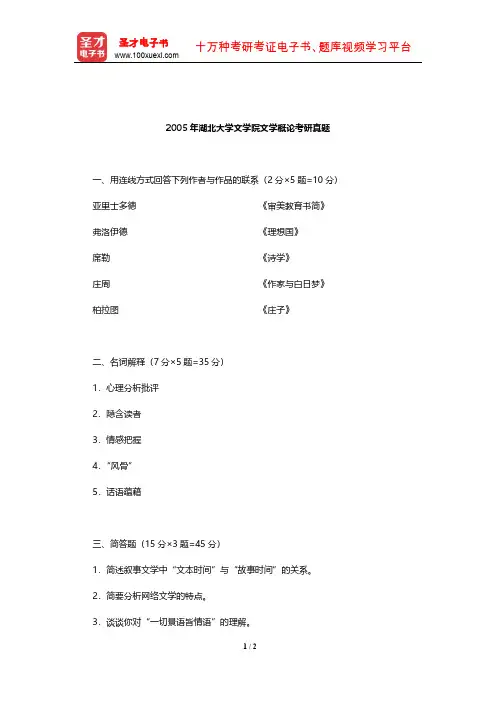
2005年湖北大学文学院文学概论考研真题
一、用连线方式回答下列作者与作品的联系(2分×5题=10分)亚里士多德《审美教育书简》
弗洛伊德《理想国》
席勒《诗学》
庄周《作家与白日梦》
柏拉图《庄子》
二、名词解释(7分×5题=35分)
1.心理分析批评
2.隐含读者
3.情感把握
4.“风骨”
5.话语蕴藉
三、简答题(15分×3题=45分)
1.简述叙事文学中“文本时间”与“故事时间”的关系。
2.简要分析网络文学的特点。
3.谈谈你对“一切景语皆情语”的理解。
四、论述题(30分×2题=60分)
1.联系具体作品,分析文学艺术如何体现作家的创造性劳动。
2.试论当前大众文化的现状与前景。
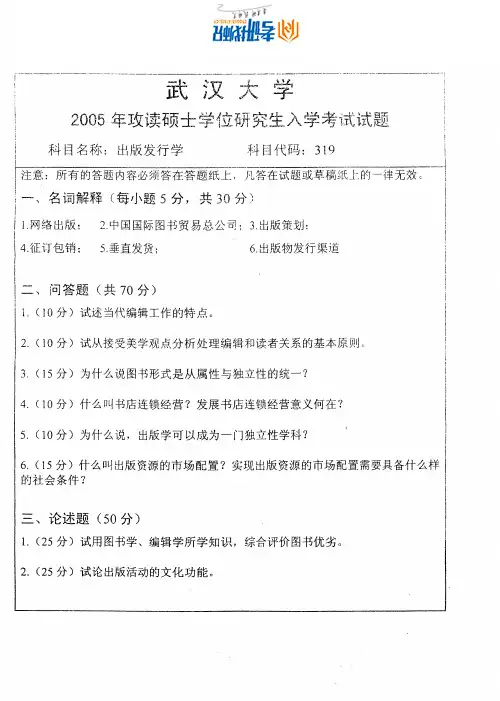
矿产资源开发利用方案编写内容要求及审查大纲
矿产资源开发利用方案编写内容要求及《矿产资源开发利用方案》审查大纲一、概述
㈠矿区位置、隶属关系和企业性质。
如为改扩建矿山, 应说明矿山现状、
特点及存在的主要问题。
㈡编制依据
(1简述项目前期工作进展情况及与有关方面对项目的意向性协议情况。
(2 列出开发利用方案编制所依据的主要基础性资料的名称。
如经储量管理部门认定的矿区地质勘探报告、选矿试验报告、加工利用试验报告、工程地质初评资料、矿区水文资料和供水资料等。
对改、扩建矿山应有生产实际资料, 如矿山总平面现状图、矿床开拓系统图、采场现状图和主要采选设备清单等。
二、矿产品需求现状和预测
㈠该矿产在国内需求情况和市场供应情况
1、矿产品现状及加工利用趋向。
2、国内近、远期的需求量及主要销向预测。
㈡产品价格分析
1、国内矿产品价格现状。
2、矿产品价格稳定性及变化趋势。
三、矿产资源概况
㈠矿区总体概况
1、矿区总体规划情况。
2、矿区矿产资源概况。
3、该设计与矿区总体开发的关系。
㈡该设计项目的资源概况
1、矿床地质及构造特征。
2、矿床开采技术条件及水文地质条件。
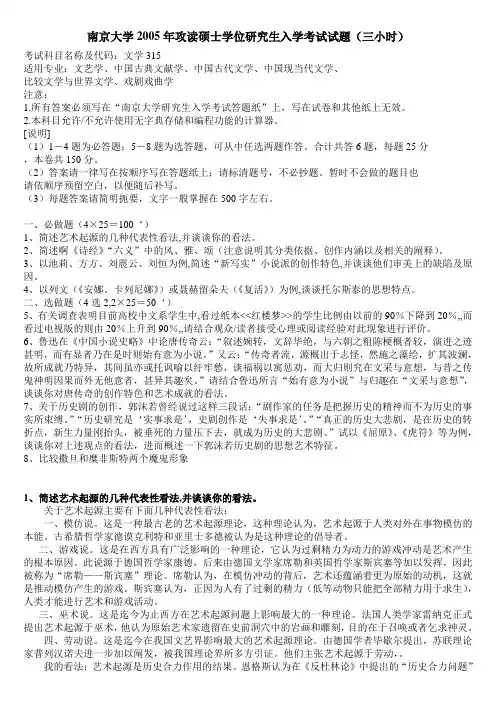
南京大学2005年攻读硕士学位研究生入学考试试题(三小时)考试科目名称及代码:文学315适用专业:文艺学、中国古典文献学、中国古代文学、中国现当代文学、比较文学与世界文学、戏剧戏曲学注意:1.所有答案必须写在“南京大学研究生入学考试答题纸”上,写在试卷和其他纸上无效。
2.本科目允许/不允许使用无字典存储和编程功能的计算器。
[说明](1)1-4题为必答题;5-8题为选答题,可从中任选两题作答。
合计共答6题,每题25分,本卷共150分。
(2)答案请一律写在按顺序写在答题纸上;请标清题号,不必抄题。
暂时不会做的题目也请依顺序预留空白,以便随后补写。
(3)每题答案请简明扼要,文字一般掌握在500字左右。
一、必做题(4×25=100‘)1、简述艺术起源的几种代表性看法,并谈谈你的看法。
2、简述啊《诗经》“六义”中的风、雅、颂(注意说明其分类依据、创作内涵以及相关的阐释)。
3、以池莉、方方、刘震云、刘恒为例,简述“新写实”小说派的创作特色,并谈谈他们审美上的缺陷及原因。
4、以列文(《安娜。
卡列尼娜》)或聂赫留朵夫(《复活》)为例,谈谈托尔斯泰的思想特点。
二、选做题(4选2,2×25=50‘)5、有关调查表明目前高校中文系学生中,看过纸本<<红楼梦>>的学生比例由以前的90%下降到20%,,而看过电视版的则由20%上升到90%,,请结合观众/读者接受心理或阅读经验对此现象进行评价。
6、鲁迅在《中国小说史略》中论唐传奇云:“叙述婉转,文辞华绝,与六朝之粗陈梗概者较,演进之迹甚明,而有显者乃在是时则始有意为小说。
”又云:“传奇者流,源概出于志怪,然施之藻绘,扩其波澜,故所成就乃特异,其间虽亦或托讽喻以纡牢愁,谈福祸以寓惩劝,而大归则究在文采与意想,与昔之传鬼神明因果而外无他意者,甚异其趣矣。
”请结合鲁迅所言“始有意为小说”与归趣在“文采与意想”,谈谈你对唐传奇的创作特色和艺术成就的看法。
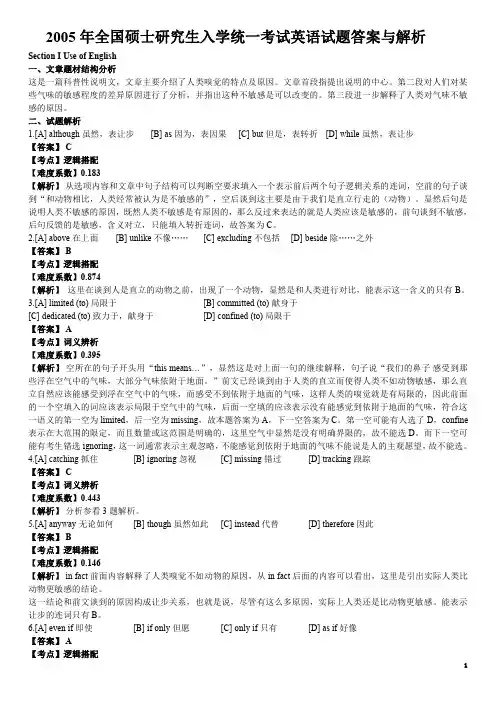
2005年全国硕士研究生入学统一考试英语试题答案与解析Section I Use of English一、文章题材结构分析这是一篇科普性说明文,文章主要介绍了人类嗅觉的特点及原因。
文章首段指提出说明的中心。
第二段对人们对某些气味的敏感程度的差异原因进行了分析,并指出这种不敏感是可以改变的。
第三段进一步解释了人类对气味不敏感的原因。
二、试题解析1.[A]although虽然,表让步[B]as因为,表因果[C]but但是,表转折[D]while虽然,表让步【答案】C【考点】逻辑搭配【难度系数】0.183【解析】从选项内容和文章中句子结构可以判断空要求填入一个表示前后两个句子逻辑关系的连词,空前的句子谈到“和动物相比,人类经常被认为是不敏感的”,空后谈到这主要是由于我们是直立行走的(动物)。
显然后句是说明人类不敏感的原因,既然人类不敏感是有原因的,那么反过来表达的就是人类应该是敏感的,前句谈到不敏感,后句反馈的是敏感,含义对立,只能填入转折连词,故答案为C。
2.[A]above在上面[B]unlike不像……[C]excluding不包括[D]beside除……之外【答案】B【考点】逻辑搭配【难度系数】0.874【解析】这里在谈到人是直立的动物之前,出现了一个动物,显然是和人类进行对比,能表示这一含义的只有B。
3.[A]limited(to)局限于[B]committed(to)献身于[C]dedicated(to)致力于,献身于[D]confined(to)局限于【答案】A【考点】词义辨析【难度系数】0.395【解析】空所在的句子开头用“this means…”,显然这是对上面一句的继续解释,句子说“我们的鼻子感受到那些浮在空气中的气味,大部分气味依附于地面。
”前文已经谈到由于人类的直立而使得人类不如动物敏感,那么直立自然应该能感受到浮在空气中的气味,而感受不到依附于地面的气味,这样人类的嗅觉就是有局限的,因此前面的一个空填入的词应该表示局限于空气中的气味,后面一空填的应该表示没有能感觉到依附于地面的气味,符合这一语义的第一空为limited,后一空为missing,故本题答案为A,下一空答案为C。
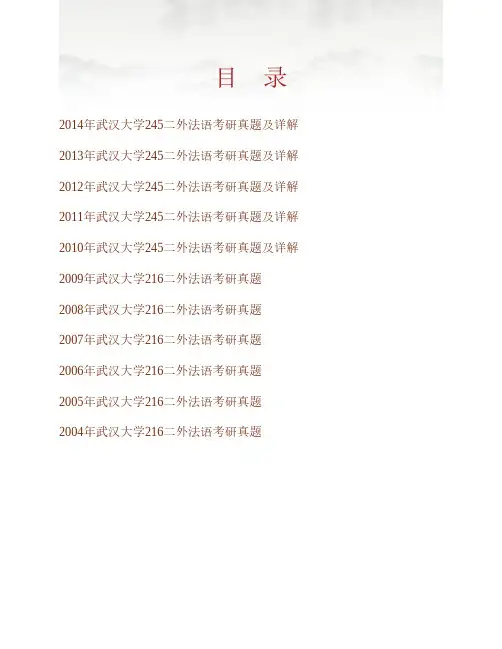
目 录2014年武汉大学245二外法语考研真题及详解2013年武汉大学245二外法语考研真题及详解2012年武汉大学245二外法语考研真题及详解2011年武汉大学245二外法语考研真题及详解2010年武汉大学245二外法语考研真题及详解2009年武汉大学216二外法语考研真题2008年武汉大学216二外法语考研真题2007年武汉大学216二外法语考研真题2006年武汉大学216二外法语考研真题2005年武汉大学216二外法语考研真题2004年武汉大学216二外法语考研真题2014年武汉大学245二外法语考研真题及详解I. Cochez la réponse qui vous paraît exacte (20%)1 (1分). Tous les jours, il va au travail bicyclette .A. à laB. enC. sur la D. à2 (1分). Nous avons appris cette nouvelle la radio.A. àB. dansC. par D. deD【答案】句意:每天他骑自行车上班。
à bicyclette“骑自行车”,固定搭配。
【解析】A【答案】句意:我们从广播上听到这个消息。
à la radio“从广播上”,固定搭配。
【解析】3 (1分). Les enfants dorment plus de l2 heuresA. à jour B. par jourC. le jourD. de jour4 (1分). Tu peux venir me voir midi et demi.A. après B. il y a C. enD. depuis【解析】句意:你可以在十二点半后来看我。
après 表示时间,“在……以后”;il y a“在……之前“,表示已经多久了,通常是时间段,一般只用于过去时,如 il y a deux jours“两天前”;en 表示完成某事实际用的时间;depuis 表示“从……时候起”,通常我们可以知道时间的起点,但是之后可能会持续下去,一般用于现在时,venir voir 是瞬间动作无持续的意思。
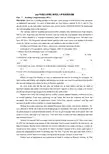
2005年武汉大学博士研究生入学考试英语试题Part ⅠReading Comprehension (40%)Directions: There are 5 reading passages in this part. Each passage is followed by some questions or unfinished statements. For each of them there are four choices marked A, B, C, and D. You should decide on the best choice and mark your answer on the ANSWER SHEET by blackening the corresponding letter in the brackets.The calendar used in Australia and in most other countries was introduced by Pope Gregory XIII in 1582. It provides for 366 days in those years for which the year number when divided by 4 gives a whole number (i. e. without a remainder), those years are called leap years. All other years have 365 days. The Gregorian calendar further specifies that years whose year number is divisible evenly by 100 are not leap years, unless the year number is also divisible by 400.In a leap year February has 29 days, whereas in a non-leap year it has 28 days.A decade is a 10-year period, such as I January 1885--31 December 1894.1. Which one of the following years was a leap year?A. 1880B. 1894C. 1906D. 19262. Which one of the following years will not be a leap year?A. 2000B. 2024C. 2052D. 30003. How many leap years will there be in the decade commencing 1 January 2019?A. 1B. 2C. 3D. 44. Since 1582, the maximum number of leap years possible in any decade is ______.A. 2B. 3C. 4D. 5When you meet Tim Winton, it's easy to understand his success at writing for teenagers. He likes surfing and fishing and camping and hanging out in the vast tract of sand dunes that borders the one-pub fishing town where he lives in Western Australia.He even looks like the big kid who sat behind you in high school and has the kind of laid-back manner and earthy conversation that you know appeals to those too young to be treated as kids but not grown-up enough to be admitted to the adult world.Winton's first foray into teenage fiction, Lockie Leonard, Human Torpedo, is about to go into its second printing. Even more gratifying for the writer has been the response the book has prompted. He's had scores of appreciative letters "from kids, parents, teachers", and has read passages from the book to students in country high schools.Writing for young readers has also enabled Winton to find a wider, non-literary audience. "It's very difficult to break out of the few-thousand-group of Australians who read, of whom half or all are professional or semi-professional readers. It's nice to get to people who aren't jaded, who will come at a story and read it for what it is. "You don't have to deal with their education and their past and their biases."Winton was himself still a teenager when he started writing seriously at 16. Three years later, in 1981, he was named joint winner of The Australian V ogel Literary Award for his first novel, An Open Swimmer. Had he known when he was 16 how difficult it is to make a living as a writer, he would never have started. "I was about 10 when I decided I wanted to be a writer, and I guess I lacked the imagination to think of anything else," he said. "I got the idea and I just stuck with it. I was unaware of how hard it is to make a living from the people you have to deal with."Neither lack of imagination nor inattention to detail is evident in Winton's writing. In ThatEye, The Sky, he takes us into the turbulent soul of his 12-year-old protagonist, Morton Flack, with prose that sends you back to long, hot summer holidays in the country.The hot white day swims along real snow like the sun is breast-stroking through that blue sky when it should be going freestyle. Everyone hangs around the shade of the house listening to the trees in the east wind. The ground is wobbly with heat. The house ticks. You can hear seeds popping, grass drying up and fainting flat. You can hear the snakes puffing.Other young protagonists have been given voice in Winton's short stories, so the transition to writing for teenagers, instead of about them, was a smooth one. "Lockie's not so different in tone from the adult books," he said. "If you get too self-conscious when you're writing for kids, you end up talking down to them--you just use your own tone and be yourself, and if that doesn't work, it probably wouldn't have anyway."5. Winton hopes to reach an audience (in Paragraph 4) that is ______.A. youthful and caringB. unprofessional and jadedC. educated and widely readD. unbiased and spontaneous6. Which of these statements is best supported from the passage in Paragraph 5?A. It is best to start writing when you are young.B. Earning a living from writing requires painstaking effort.C. The decision to become a writer was carefully considered.D. The decision to become a writer was not carefully considered.7. According to the last paragraph, the transition from writing for an adult audience to writing fora younger audience is easy for Winton because ______.A. he deliberately adopts a suitable toneB. it has happened later in his writing careerC. he has written about young people beforeD. he has been preparing for this for much of his writing career8. The kind of tone Tim Winton aims for in his writing is best described as ______.A. gentleB. naturalC. humbleD. self-consciousRobert Menzies was conservative Prime Minister of Australia from 1939 to 1941 and again from 1949 until his retirement in 1966. Menzies provoked a variety of responses during his political career. Views Ⅰto Ⅳbelow summarize some of those responses.View ⅠThe supreme twentieth-century statesman and politician, presiding with ease over the nation, and representing Australia abroad with dignity and aplomb.View ⅡAuthoritarian despite his professed liberal beliefs, he was the enemy of the workers, who stayed in office for seventeen years through a combination of unscrupulous opportunism, remarkable good luck, and the gullibility of the Australian people.View ⅢMenzies imposed the values of a bygone age on Australia, with his devotion to Britain and the British monarchy, and his cautious conservatism. He suppressed a new, creative, energetic generation by cultivating smugness, fear and indifference in the Australia of the 50s and 60s.View ⅣDownright democratic, something new and different but with an easy-going manner and aggressive independence.9. Which one of the Views(Ⅰ--Ⅳ)expresses the strongest admiration for Menzies?A. ⅠB. ⅡC. ⅢD. Ⅳ10. Which one of the Views(Ⅰ--Ⅳ) is most damning about Menzies' effect on Australia'scultural identity?A.ⅠB. ⅡC. ⅢD. Ⅳ11. "Aggressive independence" (View Ⅳ) is most at odds with the suggestion of Menzies' ______.A. easy authority (View Ⅰ)B. hypocrisy (View Ⅱ)C. political cunning (View Ⅱ)D. devotion to Britain (View Ⅲ)12. Views I to IV of Menzies all represent him as a man who was ______.A. dignified and remoteB. scheming and ruthlessC. rigid and old-fashionedD. forceful and influentialIn the following passage, Philip Roth is talking to a friend, Joanna, about his father."Did I ever tell you what happened when he was mugged a couple of years ago? He could have got himself killed. '"No. Tell me.""A black kid about fourteen approached him with a gun on a side street leading to their little temple. It was the middle of the afternoon. My father had been at the temple office helping them with mailing or something and he was coming home. The black kids prey on the elderly Jews in his neighborhood even in broad daylight. They bicycle in from Newark, he tells me, take their money, laugh, and go home". "Get in the bushes," he tells my father. "I'm not getting in any bushes," my father says. "You can have whatever you want, and you don't need that piece to get it. You can put that piece away." The kid lowers the gun and my father gives him his wallet." Take all the money," my father says, "but if the wallet's of no value to you, I wouldn't mind it back. "The kid takes the money, gives back the wallet, and he runs. And you know what my father does? He calls across the street, "How much did you get?" And the kid is obedient--he counts it for him. "Twenty-three dollars, "the kid says." Good," my father tells him-- "now don't go out and spend it on crap."Joanna laughed. "Well, he's not guilty, your father. Of course he treats him like a son. He knows that the Jews in Bialystok were not responsible for the New England slave trade.""It's that--it's more. He doesn't experience powerlessness in the usual way.""Yes, he's oblivious to it,"she said. "He won't give in to it. It makes for terrific insensitivity but also for terrific guts"."Yes, what goes into survival isn't always pretty. He got a lot of mileage out of never recognizing the differences among people. All my life I have been trying to tell him that people are different one from the other. My mother understood this in a way that he didn't. Couldn't. This is what I used to long for in him, some of her forbearance and tolerance, this simple recognition that people are different and that the difference is legitimate. But he couldn't grasp it. They all had to work the same way, want the same way, be dutiful in the same way, and whoever did it different was meshugge--crazy."13. Philip Roth's father refused to go into the bushes. This was most likely because he ______.A. didn't think it was necessaryB. didn't believe the mugger was seriousC. thought he would lose his money if he didD. was showing the "black kid" that he didn't understand him14. What is the most likely explanation for the kid's "obedience" (Line 15)?A. He felt sorry for the man.B. He was frightened by the old man's aggressiveness.C. He responded spontaneously to the old man's natural manner.D. He realized he could compensate for his offence by behaving respectfully.15. Philip Roth tells Joanna that he used to long for his father to be less ______.A. gutsy and courageousB. boring and conventionalC. powerless and vulnerableD. rigid and uncompromising16. The whole passage suggests that Philip Roth is ______.A. unable to explain or come to terms with the contradictory elements of his father's nature.B. able to assess his father's strengths generously while being conscious of his father's failings.C. eager to accept Joanna's explanation of his father, and to conceal any flaws in the family's relationships.D. resentful and bitter about his father's life-long antagonism to how he and his mother dealt with the world.The nuclear age in which the human race is living, and may soon be dying, began for the general public with the dropping of an atom bomb on Hiroshima on 6 August 1945. But for nuclear scientists and for certain American authorities, it had been known for some time that such a weapon was possible. Work towards making it had been begun by the United States, Canada and Britain very soon after the beginning of the Second World War. The existence of possibly explosive forces in the nuclei of atoms had been known ever since the structure of atoms was discovered by Rutherford.An atom consists of a tiny core called the "nucleus" with attendant electrons circling round it. The hydrogen atom, which is the simplest and lightest, has only one electron. Heavier atoms have more and more as they go up the scale. The first discovery that had to do with what goes on in nuclei was radioactivity, which is caused by particles being shot out of the nucleus. It was known that a great deal of energy is locked up in the nucleus, but, until just before the outbreak of the Second World War, there was no way of releasing this energy in any large quantity. A revolutionary discovery was that, in certain circumstances, mass can be transformed into energy in accordance with Einstein's formula which states that the energy generated is equal to the mass lost multiplied by the square of the velocity of light.The A-bomb, however, used a different process, depending upon radioactivity. In this process, called "fission", a heavier atom splits into two lighter atoms. In general, in radioactive substances this fission proceeds at a constant rate which is slow where substances occurring in nature are concerned. But there is one form of uranium called "U235" which, when it is pure, sets up a chain reaction which spreads like fire, though with enormously greater rapidity. It is this substance which was used in making the atom bomb.The political background of the atomic scientists' work was the determination to defeat the Nazis. It was held--I think rightly--that a Nazi victory would be an appalling disaster. It was also held, in Western countries, that German scientists must be well advanced towards making an A-bomb, and that if they succeeded before the West did they would probably win the war. When the war was over, it was discovered, to the complete astonishment of both American and British scientists, that the Germans were nowhere near success, and as everybody knows, the Germans were defeated before any nuclear weapons had been made. But I do not think that nuclear scientists of the West can be blamed for thinking the work urgent and necessary. Even Einsteinfavored it.When, however, the German war was finished, the great majority of those scientists who had collaborated towards making the A-bomb considered that it should not be used against the Japanese, who were already on the verge of defeat and, in any case, did not constitute such a menace to the world as Hitler. Many of them made urgent representations to the American Government advocating that, instead of using the bomb as a weapon of war, they should after a public announcement, explode it in a desert, and that future control of nuclear energy should be placed in the hands of an international authority. Seven of the most eminent of nuclear scientists drew up what is known as "The Franck Report" which they presented to the Secretary of War in June 1945. This is a very admirable and far-seeing document, and if it had won the assent of the politicians, none of our subsequent terrors would have arisen.17. We may infer that the writer's attitude towards the A-bomb is that ______.A. it is a necessary evilB. it is a terrible threat to the whole of mankindC. it played a vital part in defeating the JapaneseD. it was a wonderful invention18. The American and British scientists were astonished at the end of the Second World War against Germany because ______.A. the Germans had been defeated without the use of nuclear weaponsB. the Western countries had won before they had invented nuclear weaponsC. they thought the Germans would probably win the warD. the Germans had made little progress in developing nuclear weapons19. According to the writer, most scientists who had helped in making the A-bomb considered that it should not be used against the Japanese because ______.A. it was such a dangerous weaponB. its use against the Japanese was unnecessaryC. it was a very inhumane weaponD. the German war was finished20. It is implied that the nuclear scientists ______.A. might not have agreed to develop the bomb if there had been no Nazi threatB. would have developed the bomb even without the Nazi threatC. would have made the bomb, under peace-time conditions, but only for the use of an international authorityD. developed the bomb because Einstein thought it urgent and necessary.Part ⅡEnglish-Chinese Translation (20%)Directions: Read the following passage carefully and then translate the underlined sentences into Chinese and write your translation on the ANSWER SHEET.1. American hopes that pressure from the U S will force Japan to suddenly dismantle its trade harriers are almost certain to evaporate in disappointment. The fact is that Washington faces an obstacle far more formidable than a few power brokers in Tokyo's government offices. It must buck centuries-old, deeply ingrained Japanese customs. To move the Japanese government, Washington must move an entire nation.So far, the U S has had only limited success despite congressional threats to retaliate. In an April 9 nationwide broadcast, Prime Minster Yasuhiro Nakasone urged the Japanese to buy moreimported goods and unveiled a long-awaited three-year plan to ease import restrictions. But his program was far short of what Washington hoped to see.White House Chief of Staff Donald Regan said the Japanese offered "few new or immediate measures." While the plan did promise fewer curbs on imports of telecommunications gear, medicine and medical equipment, it offered no relief for American forest products--which are among the most contentious trade issues.Nakasone gives every sign of being Sincere in his desire to reduce a Japanese surplus in trade with the U S that hit 36.8 billion dollars in 1984 and could soon top 50 billion. 2. Yet to rely on any one Japanese political leader, no matter how popular he is at home, to reverse trade policies is to underestimate the culture and traditions that weigh heavily against a breakthrough.Big business and dozens of anonymous bureaucrats have as much power as Japan's top selected leaders."The whole concept that we can turn this around right now is patently ridiculous, "says an American trader who has lived and worked here since 1952. "The vested interests are being shaken and slowly moved, but at a pace too slow for the eye to follow."That view is echoed by a U S diplomat closely involved in the efforts to open Japanese markets to American goods, Washington's stock solution to the ballooning trade imbalance.3. "Japan is a relationship society rather than a transactional society", he says. "You cannot alter that kind of a system with a television speech or a batch of general proposals, no matter how well-intentioned they are."Beyond specific tariffs of other official barriers to imports, experts here say that the U S faces these obstacles:Nearly total domination of the Japanese market by a few dozen giant conglomerates that strongly oppose even token competition--be it from abroad or emerging domestic firms.An elite, thickly layered bureaucracy that historically has drafted laws and regulations as well as enforced them, and both of these powers would be threatened by trade reforms.A longtime relationship between business and government that critics say fosters collusion and hinders foreign entry into domestic markets.Adamant support for import restrictions among Japanese farmers, one of the most powerful political forces.4. A highly developed sense of loyalty to established practices and relationships that often outweighs any "duty" to society as a whole or, in some cases, even personal best interest. Esteem for caution and consensus in decision-making at all societal levels and conversely, resentment of governmental fiats or one-man decrees--even if that man is the head of government.Compounding Washington's problem is Nakasone's weak position within his own party, the Liberal Democrats, who have ruled Japan for 30 years. His standing is so complex and fragile that he has been forced to yield all but three of 2l cabinet positions to rival political factions. His cabinet colleagues are far less committed than he is to trade reforms, making it difficult for the Prime Minister to muscle proposals through either the bureaucracy or the Diet, Japan's parliament.The existence of "Japan, Inc." --the concept of an entire nation conspiring to advance economically at any cost--is a topic of debate among both Japanese and outsiders. But there is no dispute over how the system actually works.Part ⅢChinese-English Translation (20%)Directions: Translate the following short paragraphs into English and write your translation on theANSWER SHEET.1.他是个极其自负的怪人。